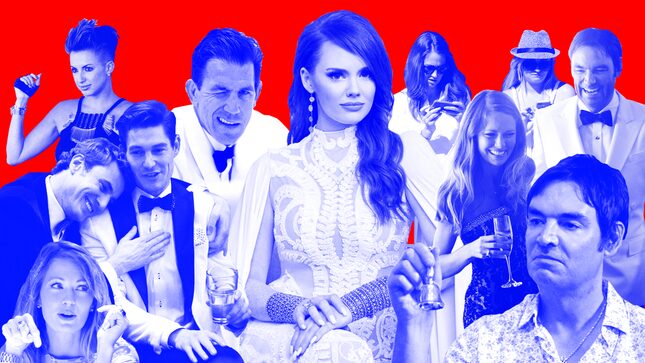The Gilded Racism of Southern Charm, Bravo's Plantation Fantasy
Entertainment
Graphic: Elena Scotti
From its inception, Southern Charm was designed to serve as a peek behind the veil of Southern high society. Whitney Sudler-Smith, the show’s creator and Charleston socialite, likely pitched his access to that elusive camp when shopping the project around. The son of Patricia Altschul, purveyor of fine arts and antiquities, Sudler-Smith’s stepdad was Arthur Goodhart Altschul, a general partner at Goldman Sachs and an heir to the Lehman fortune. Through his Charleston social circle, he roped in a motley crew of what could be considered the city’s moneyed “elite”: former reality star Cameron Eubanks; disgraced state treasurer Thomas Ravenel; steel heir and Charleston royalty Shep Rose; and Kathryn Dennis, a proud descendant of John C. Calhoun, vice president to Andrew Jackson and staunch defender of slavery.
Together, the cast would spearhead Bravo’s efforts to romanticize a whitewashed vision of Charleston with boozed-up hunks and pretty-faced blondes, the show’s theme song announcing what could be expected from its new generation of Confederacy sympathizers: “He’s got money/He’s in magazines/He’s got more honies than any honeybee.”
Through glitzily filtered shots of former plantation houses, charity galas, and raucous parties, early promos promised the show would tear down the veil that separates Charleston’s “ruling” families from the rest. “Charleston’s special. We have our ways here, in terms of being genteel in our customs,” Ravenel announced in promotional trailers for Southern Charm’s first season, underscored by Southern big band swing. Craig Conover delivered the first season’s runaway catchphrase, claiming that in Charleston, “Men don’t want to grow up.” Another teaser for the premiere promised the reality drama was not your “duck calling, moonshining, hand-fishing kind of show.” Bravo couldn’t have made their intentions clearer. This is a show meticulously groomed and edited to present a South stripped of its deeply violent history, filled only with smiling and “genteel” white 20-somethings, partying and spending money that isn’t theirs.
Its cast members aren’t just propped-up party fiends with powerful families; they are the South as many still wish it to be.
This marketing push in 2014 seemed manufactured to fill a “conservative” hole in Bravo’s lineup. The network was then best known for The Real Housewives, as well as more high-brow reality shows like Project Runway and Top Chef. The marketing for Southern Charm contrasted with the recently debuted Vanderpump Rules. One featured oiled-up and horny Los Angeles waitstaff; the other, equally horny yet more conservative-friendly, “genteel” Southern gentleman and “proper” ladies. This strategy, however, was made only more dire by the election of Donald Trump two seasons in. The language of the show seemed to mirror the framing of Trump’s campaign—namely the “return” to a past America, when slavery was legal and black people and women couldn’t vote. Its cast members aren’t just propped-up party fiends with trust funds and powerful families; they are the South as many still wish it to be.
Southern Charm is not the only pop culture phenomenon to hold allegiance to the loaded idea of this rose-colored South. Celebrities like Blake Lively and Reese Witherspoon both have released brands that play on those images. On its site, Witherspoon’s clothing brand Draper James claims it “is classic American style, steeped in Southern charm, feminine and pretty. Likewise, a photoshoot from Lively’s failed lifestyle brand Preserve, back in 2014, was titled “Allure of the Antebellum.” Lively and husband Ryan Reynolds were even married on a plantation, as is still common among upper-middle-class white Southerners. Whether Bravo will admit it or not, Southern Charm mines this antiquarian nostalgia for the most shameful time in American history.
So it shouldn’t be surprising that the messages coded in Southern Charm have begun to spring from the screen and into life. A few weeks ago, Kathryn Dennis sent a string of harassing Instagram DMs to Charleston-based activist Mika Gadsden, including a monkey emoji. Dennis’s tirade began after local nail salon owner Katie Shields posted about organizing a “Trump Boat Parade,” according to Buzzfeed News. Paulina Rodriguez, who sold her own merchandise through the shop, soon cut ties with them through her Instagram stories. In retaliation, Shields prompted her followers to “explain that supporting Trump does not make you racist” to Rodriguez, resulting in an influx of harassment in her DMs and mentions. Dennis joined in, with the reality star posting a video of her herself at the shop in solidarity.
-

-

-

-

-

-

-

-

-

-

-

-

-

-

-

-

-

-

-

-

-

-

-

-

-

-

-

-

-

-

-

-

-

-

-

-

-

-

-

-








































